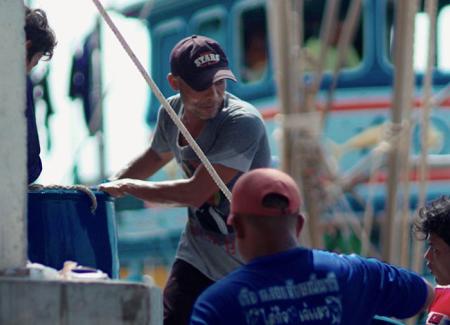Strengthening Labor Conditions and Promoting Good Jobs in the Fishing Sector
Read the fact sheet: Strengthening Labor Conditions and Promoting Good Jobs in the Fishing Sector.
An official website of the United States government.
Here’s how you know
The .gov means it’s official.
Federal government websites often end in .gov or .mil. Before sharing sensitive information, make sure you’re on a federal government site.
The site is secure.
The https:// ensures that you are connecting to the official website and that any information you provide is encrypted and transmitted securely.
The FAIR Fish project helps create a fair global playing field for workers and responsible U.S. businesses by engaging with the private sector to reduce forced labor and human trafficking in the fishing and seafood processing sectors in Thailand. By working directly with companies and their labor recruiters, the project helps these companies improve their approaches to addressing forced labor and human trafficking in recruitment processes, strengthen compliance with recruitment policies and procedures by third-party recruiters, and promote responsible recruitment among other small- and medium-sized enterprises.
Recruitment agencies play an important role in helping workers find decent work and matching qualified candidates with available jobs. Unfortunately, the recruitment process often lacks transparency and a clear line of accountability for the actors involved to uphold worker protections. When employers use third-party labor recruiters, they risk losing control of the recruitment process, particularly when it is spread across several agencies and agents, each fulfilling discrete roles and often charging different systems. The informality in the process can make it challenging to bring recruitment processes into compliance with international guidelines. Many of the 25 million forced laborers worldwide were deceived or coerced by employers or labor recruiters. Such deceitful employers and recruiters mislead workers about the nature and conditions of work, confiscate passports and other identity documents, exact recruitment fees that led to debt bondage, withhold wages, and even threaten or commit acts of physical violence.
FAIR Fish assists two private sector companies, as well as their recruitment agencies and recruiters, as they develop a responsible recruitment pilot model for small- and medium-size enterprises built on the principles of the Business Social Compliance Initiative. Activities include establishing a business case for responsible recruitment and coaching targeted recruitment agencies to comply with the companies’ new recruitment policies.
Once the model has been finalized, FAIR Fish will develop a responsible recruitment curriculum, translated and culturally adapted for Thailand, Myanmar, and Cambodia. After training a pool of master trainers, other local recruitment agencies and labor brokers will be trained in their respective countries.
The project has:

An innovative project is creating a culture of responsible recruitment in the Thai seafood sector and empowering migrant laborers with access to critical information about their rights.
